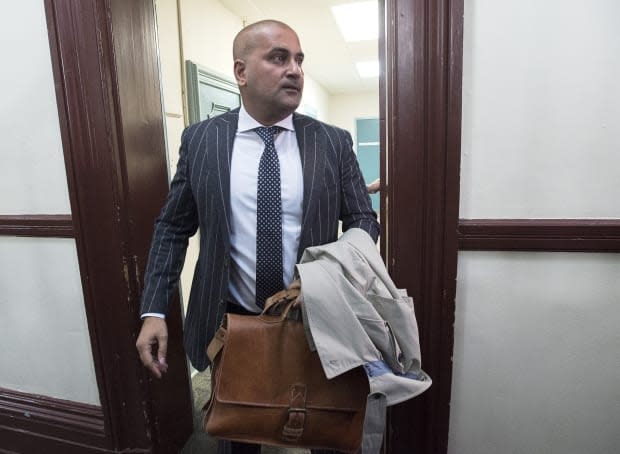Former Halifax taxi driver gets 2-year sentence for sexual assault
A former Halifax taxi driver has been handed a sentence of two years in prison for sexually assaulting a woman eight years ago.
Bassam Al-Rawi was found guilty in August of sexually assaulting the woman in his Bedford, N.S., apartment in the early hours of Dec. 15, 2012.
Al-Rawi appeared Thursday in Nova Scotia Supreme Court for his sentencing, one day after his bid for a mistrial was rejected. Al-Rawi, dressed in a navy suit, did not address the court.
In his decision, Justice Gerald Moir said he considered a pre-sentence report, the victim's impact statement, doctor's letters about Al-Rawi's wife's current pregnancy, and a letter from Al-Rawi's wife about how the proceedings have impacted her.
The victim, whose name is protected by a publication ban, testified during Al-Rawi's trial that she drove to Halifax from Pictou County with a group of friends on Dec. 14, 2012.
After a night out, she said a taxi driver picked her up while she was lost downtown. He took her back to his place, and later assaulted her in his bedroom while she was drunk and pretending to be unconscious.
The victim reported the assault right away, but Halifax police didn't lay any charges. She came forward again years later after hearing the same taxi driver had been acquitted of a different sex assault in 2017.
Police reopened her case, and laid a sex assault charge in 2018.
2 years in federal prison
Moir said he had to weigh the impact on the victim against the consequences Al-Rawi now has to face when determining an appropriate sentence.
He will serve his two years in a federal prison, and likely miss the birth of his first child in May.
Al-Rawi is a Canadian citizen who came to the country as a refugee from Iraq years ago, but now lives in Germany with his wife, who was also in court Thursday. The judge said the conviction leaves Al-Rawi's German permanent residency status up in the air, and his businesses there may fail.
"The severe collateral consequences rightly incline to the low end of the range," Moir said in his decision.
Al-Rawi must provide a DNA sample and have his name added to the sex offender registry. A 10-year weapons ban is also in place.
Crown wanted longer sentence
Crown attorney Carla Ball had said a four-year sentence would be appropriate for Al-Rawi, who she said committed a violent and major sexual assault where penetration occurred.
She cited various aggravating factors, including the fact Al-Rawi assaulted the victim when he should have known she was in a vulnerable position, as she had been drinking heavily and lay on the bed with her eyes closed.
He did not receive any verbal consent, and also removed her clothes aggressively, Ball said.
The court found the assault happened outside of Al-Rawi's specific taxi duties, and Ball did not argue he was in a position of trust. However, Ball noted the victim would not have been at the apartment if Al-Rawi had not picked her up in his role as a driver.
Al-Rawi's lack of a criminal conviction record was cited as a mitigating factor. Ball noted Al-Rawi has not shown remorse or taken responsibility, but she acknowledged it is his right to do so and is not a factor in sentencing.

Speaking outside court, Ball commended the victim for her strength and bravery in following the case through to the end.
"If you come forward with your truth and something that has happened to you, and you stand by it, and you persevere, you can really make a difference," Ball told reporters.
Defence says conviction already impacting Al-Rawi
Ian Hutchison, Al-Rawi's lawyer, had suggested a sentence of two years.
He pointed to the recent Matthew Percy decision in 2019 where the former Saint Mary's University groundskeeper was handed a two-year sentence for sexual assault and six months for voyeurism.
Hutchison said when calculating sentencing, the court should also consider denunciation in an individual sense, and Al-Rawi's conviction has already caused significant impact on his life.
After his conviction, Al-Rawi was forced to hand over his passport and live with a friend in Bedford, N.S., under bail conditions.

The defence also noted that "extensive" media coverage of Al-Rawi's case has caused him difficulties with employment, and he fears for his safety in Halifax.
"Those pictures, those articles are going to remain on the internet for an awful lot longer than … our appearance before the court today," Hutchison told the judge. "It's going to affect him ... throughout his entire life."
Victim describes panic attacks, ongoing anxiety
The victim, who now lives outside the province, read her victim impact statement via video. She said the impacts of the assault continue to affect her personal life, career and mental health.
A year after the assault, she had her first panic attack. In order to heal, she said she's forced herself to revisit the incident. She's taken crisis counselling, gone through therapy, and joined a survivors' group.
Over the years, she's had to disclose her situation to her employers when asking for time off for court proceedings or therapy. She is afraid to ride in taxis but cannot avoid them as she travels for work.
The woman also said she has not had a serious romantic relationship since the assault.
"But the biggest impact for me has been the nearly eight years of fear that his predatory cycle of abuse continues," she said. "Finally, today I feel I have done enough, as Bassam Al-Rawi is held accountable by this court."
Al-Rawi and 'drunk can consent' trial controversy
This is the second sex assault charge to bring Al-Rawi before a Halifax court.
He faced previous charges related to allegations he sexually assaulted another female passenger who was found unconscious by a police officer in his cab in 2015.
That case garnered significant attention after the original trial judge made the comment, "Clearly, a drunk can consent," and acquitted Al-Rawi in 2017.
The Nova Scotia Court of Appeal ordered a new trial, saying the first judge made errors in law, including ignoring circumstantial evidence. Al-Rawi was acquitted again last September.
MORE TOP STORIES


